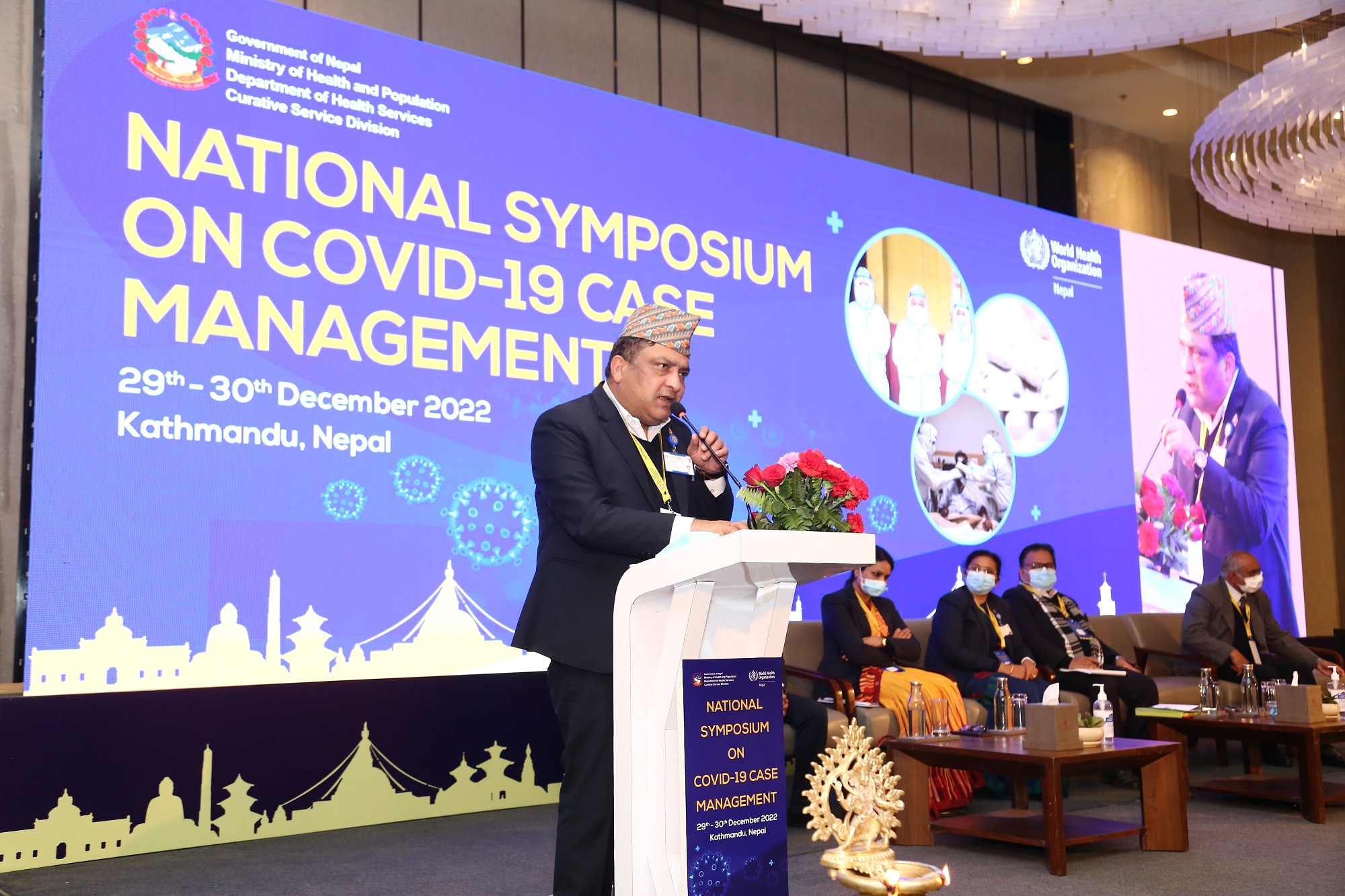Health care providers, members of professional societies, and policymakers convened at the National Symposium on COVID-19 Case Management to share experiences, discuss challenges, and deliberate on the way forward for strengthening case management systems to enhance preparedness for future emergencies.
Organized by the Ministry of Health and Population (MoHP), the program held in Kathmandu from 29 to 30 December 2022, saw the participation of officials from MoHP, Department of Health Services, clinicians, provincial health authorities, various professional societies, and researchers from both the public and private sector.

National Symposium on COVID-19 Case Management held in Bagmati Province, Nepal. Photo credit: WHO Nepal
On the first day of the symposium, participating hospitals delivered presentations on various case management issues including topics such as human resources, logistics, bed availability, laboratory services, treatment complications, etc.
B.P. Koirala Institute of Health Sciences, Narayani Hospital, COVID-19 Unified Central Hospital, Bir Hospital, Sukraraj Tropical and Infectious Disease Hospital, Patan Academy of Health Sciences, Armed Police Force Hospital, Kanti Children’s Hospital, and Shree Birendra Hospital presented in the first session chaired by Dr. Madan Kumar Upadhyaya, Chief, Quality Standard and Regulation Division, MoHP, and Dr Rabin Khadka, Provincial Health Director, Karnali Province.
Similarly, in the second session, Pokhara Academy of Health Sciences, Chitwan Medical College, Bheri Hospital, Seti Provincial Hospital, and Hospital for Advanced Medicine & Surgery (HAMS) Hospital presented on the same topics. This session was chaired by Dr Bikash Devkota, Secretary, Ministry of Health, Lumbini Province, and Dr Jagadish Joshi, Provincial Health Director, Sudurpashchim Province.

Q&A sessions held after the presentations at the symposium held in Bagmati Province, Nepal. Photo credit: WHO Nepal
The second day began with the review of COVID-19 related studies in Nepal by National Health Research Council (NHRC). 33 COVID-19 related research studies were conducted by NHRC as principal Investigator or lead. The methodology of the major studies, alongside its findings, were presented.
Altogether 53 papers (10 oral presentations and 43 poster presentations) were presented on topics ranging from clinical management to the outcome of COVID-19 patients after discharge and rehabilitation in post COVID-19 recovery.

Panel discussions at the symposium held in Bagmati Province, Nepal. Photo credit: WHO Nepal
Following the presentations, a panel discussion was held. Prof. Dr Buddha Basnyat, Prof. Dr. Nisha Jyoti Shrestha, Prof. Dr Subash Prasad Acharya, and Dr Diptesh Aryal, highlighted key points such as capacity building for clinical decision making, reducing antimicrobial resistance, proper implementation of documents and guidelines, increment in the national budget for healthcare in Nepal, need-based acceptance on the donated items, effective use of the equipment and its redistribution, and task shifting.
Dr Bibek Lal Karna, Director of Family Welfare Division, presented on “COVID-19 vaccinations and way forward”; Dr Runa Jha, Director, National Public Health Laboratory (NPHL) presented on the “Role of NPHL on COVID-19 Case Management”; and the last presentation on “Post COVID Clinical Case Management” was given by Dr Sabin Thapaliya.
The symposium provided a unique opportunity for healthcare providers and policymakers to interact with each other and exchange ideas and perspectives on the best approaches to dealing with current issues and challenges for improving Nepal's health system particularly focused on case management. Awards were also presented for best oral and poster presentations.

Dr Roshan Pokharel, Secretary, Ministry of Health and Population, providing his opening remarks at the symposium. Photo credit: WHO Nepal
Speaking at the inaugural ceremony, Dr Roshan Pokharel, Secretary, MoHP, said: "I hope this symposium will help in finalizing the way forward on the actions needed to strengthen preparedness and response for emergency and disaster management."

Dr Rajesh Sambhajirao Pandav, WHO Representative to Nepal, providing his opening remarks at the symposium. Photo credit: WHO Nepal
“I am sure the presented scientific research, on frontline experienced best practices and recommendations for COVID-19 case management, will be crucial to develop a way forward for similar public health emergencies in the future, and the panel discussion will provide the brainstorming needed to strengthen our preparedness to respond to emergency cases,” stated Dr Rajesh Sambhajirao Pandav, WHO Representative to Nepal.
WHO provided technical and financial support for the program and was part of the scientific committee involved in selection of the abstracts for oral and poster presentations.
Organizing such programs at regular intervals will help ensure continuity of dialogue and foster collaborative actions to strengthen the overall health system resilience to disasters and public health emergencies.
